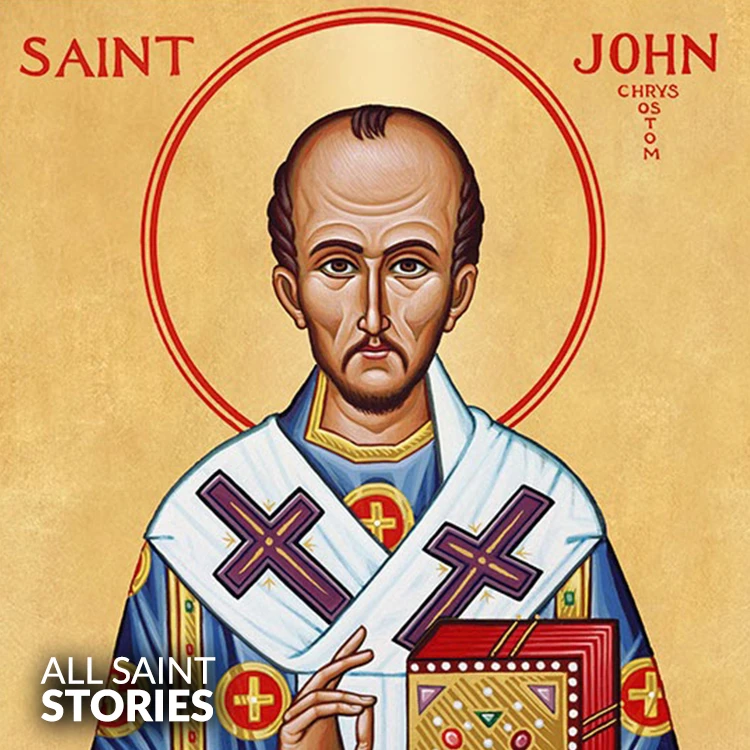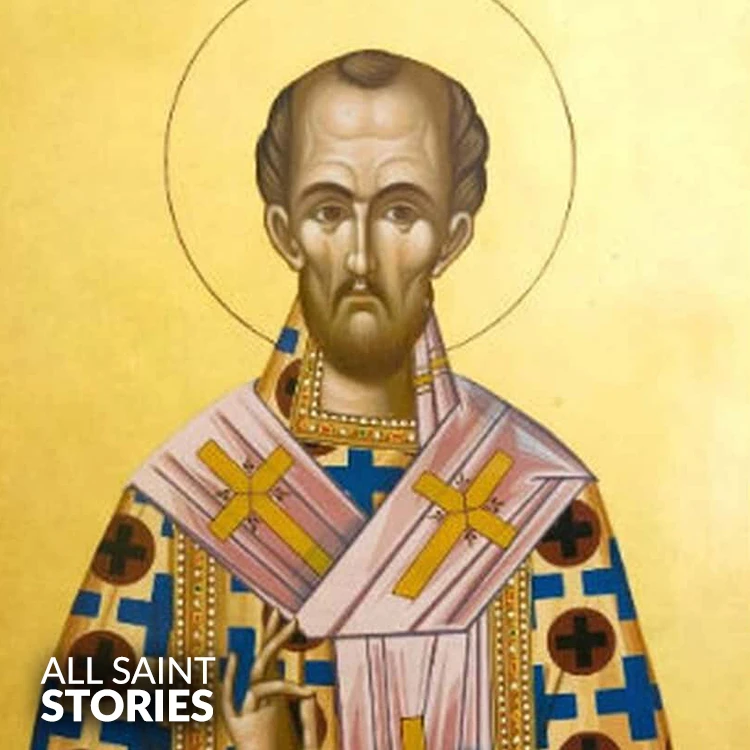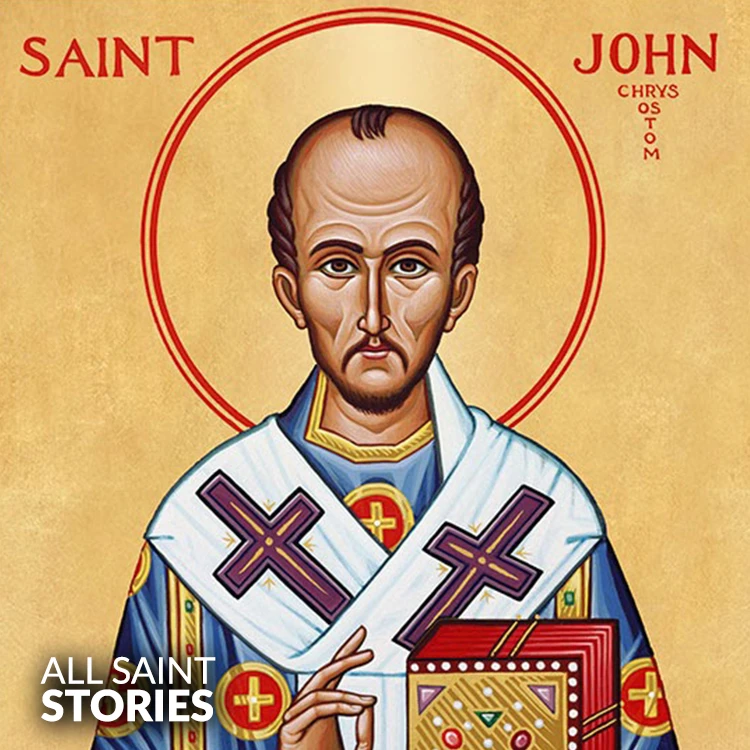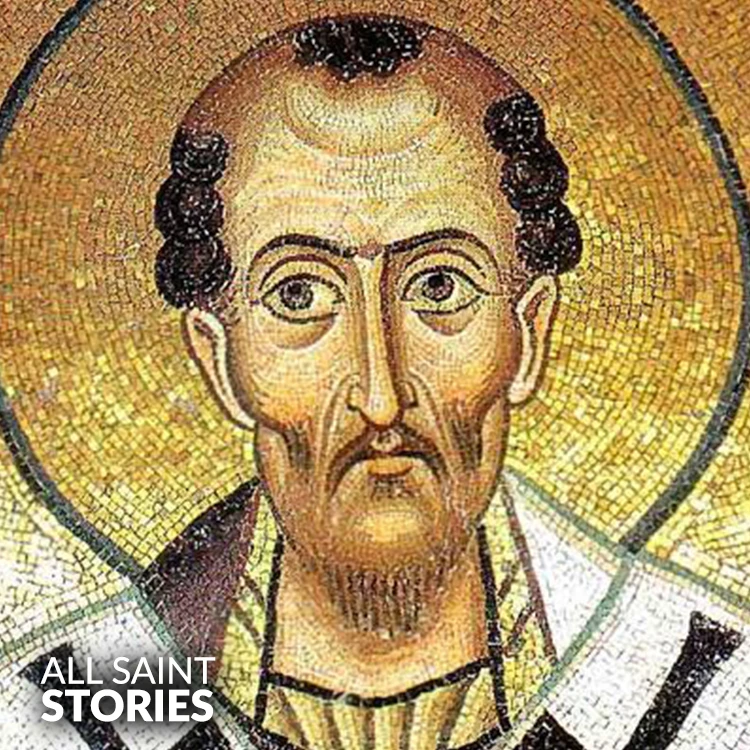O holy St. John Chrysostom, Golden-mouthed preacher of God's truth, Grant us wisdom to speak with love, Courage to stand for righteousness, And hearts aflame with divine grace. Intercede for us, that we may grow In faith, humility, and holiness. Amen.
ST. JOHN CHRYSOSTOM (BISHOP)
ST. JOHN CHRYSOSTOM (BISHOP)

St. John Chrysostom, Archbishop of Constantinople, was renowned for his powerful preaching, humility, and devotion to social justice. His eloquent sermons earned him the title "Golden-Mouthed." A prolific writer and Doctor of the Church, he dedicated his life to reforming the clergy and serving the poor. His legacy continues to inspire Christians today, with his teachings on repentance, humility, and charity still widely regarded.
St. John Chrysostom (c. 349–407 AD) was a prominent Archbishop of Constantinople, one of the greatest preachers in Christian history, and a Doctor of the Church. His title "Chrysostom" means "golden-mouthed" in Greek, reflecting his exceptional eloquence and persuasive preaching. Born in Antioch, he was raised by his devout mother, Anthusa, following his father's early death. His education was deeply rooted in rhetoric, philosophy, and theology, which formed the foundation of his later preaching career.
Initially pursuing monastic life, John withdrew to the Syrian wilderness, embracing asceticism, prayer, and spiritual study. However, he later returned to Antioch, where his sermons gained immense popularity. His powerful homilies, focused on practical Christianity, called for repentance, humility, charity, and a transformation of society. His words were designed to engage the heart and inspire change, making him a widely respected figure in both religious and secular circles.
In 398 AD, John was appointed Archbishop of Constantinople. His tenure was marked by vigorous reforms, emphasizing moral integrity in the clergy and calling for an end to corruption. He was a staunch advocate for social justice, strongly opposing the exploitation of the poor and marginalized. His fearless criticism of both the imperial court and wealthy elites earned him both admiration and enemies.
John's writings include numerous homilies and commentaries on Scripture, with his works on the Gospel of Matthew and the letters of St. Paul being among the most notable. His preaching urged Christians to live out the teachings of Christ in their daily lives, focusing on inner transformation and a life of virtue. He placed a strong emphasis on the moral responsibilities of the faithful, especially in their relationships with the poor and needy.
Despite his popularity, John’s outspoken nature and his reform efforts eventually led to his exile. In 404 AD, he was banished from Constantinople under the orders of the Empress Eudoxia, who was offended by his criticisms. John’s exile took him to the remote region of Comana, where he endured harsh conditions, eventually leading to his death in 407 AD. His death, attributed to the brutal treatment he received during his exile, was mourned deeply, and he was later recognized as a martyr for his unwavering commitment to his faith.
St. John Chrysostom's legacy is profound, particularly in the Eastern Orthodox Church, where he is considered one of the greatest Church Fathers. His feast day is celebrated on September 13 in the Western Church, and his writings continue to influence Christian thought and practice. As one of the Church’s Doctors, his message of personal holiness, charity, and courage remains timeless, calling all Christians to live out the gospel with sincerity and devotion.
Video Not Found
The information on this website is compiled from various trusted sources. While we aim for accuracy, some details may be incomplete or contain discrepancies.
If you notice any errors or have additional information about this saint, please use the form on the left to share your suggestions. Your input helps us improve and maintain reliable content for everyone.
All submissions are reviewed carefully, and your personal details will remain confidential. Thank you for contributing to the accuracy and value of this resource.
Credits & Acknowledgments
- Anudina Visudhar (Malayalam) – Life of Saints for Everyday
by Msgr. Thomas Moothedan, M.A., D.D. - Saint Companions for Each Day
by A. J. M. Mausolfe & J. K. Mausolfe - US Catholic (Faith in Real Life) – Informational articles
- Wikipedia – General reference content and images
- Anastpaul.com – Saint images and reflections
- Pravachaka Sabdam (Malayalam) – Saint-related content and insights
We sincerely thank these authors and platforms for their valuable contributions. If we have unintentionally missed any attribution, please notify us, and we will make the correction promptly.
If you have any suggestion about ST. JOHN CHRYSOSTOM (BISHOP)
Your suggestion will help improve the information about this saint. Your details will not be disclosed anywhere.
© 2026 Copyright @ www.allsaintstories.com





 English
English
 Italian
Italian
 French
French
 Spanish
Spanish
 Malayalam
Malayalam
 Russian
Russian
 Korean
Korean
 Sinhala
Sinhala
 Japanese
Japanese
 Arabic
Arabic
 Portuguese
Portuguese
 Bantu
Bantu
 Greek
Greek
 German
German
 Dutch
Dutch
 Filipino
Filipino